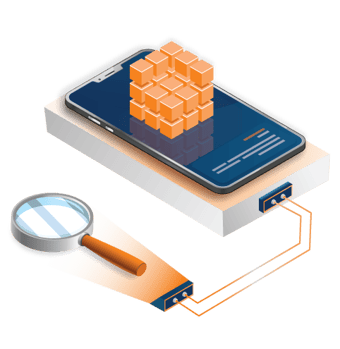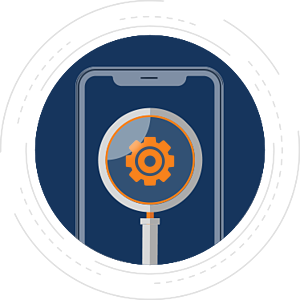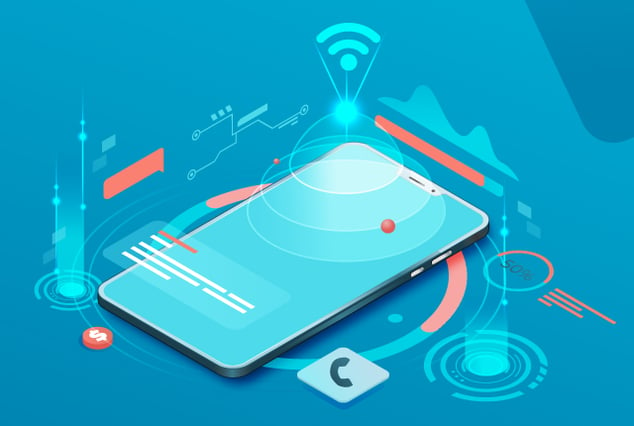Blockchain has brought revolution like other technologies such as AI, VR, IoT, and many others. This expert series will provide you with information about blockchain and how it revolutionized the mobile application industry.
What Is Blockchain?
Blockchain is a decentralized, distributed electronic database wherein transactions are shared among a number of users, each one verifying that the database is accurate and preventing any unauthorized transactions.
The main difference between a typical database and a blockchain is the way the data is structured. A typical database structures its data into tables, whereas a blockchain structures its data into blocks chained together and is used for the decentralized storage of records or data.
Blockchain Transaction Process
-
A new transaction is entered.
-
Then transmitted to a network of peer-to-peer computers scattered across the world.
-
This network of computers then solves equations to confirm the validity of the transaction.
-
Once confirmed to be legitimate transactions, they are clustered together into blocks.
-
These blocks are then chained together creating a long history of all transactions that are permanent.
-
The transaction is completed.
Properties of Blockchain Technology
-
Programmable
A blockchain is programmable(i.e. Smart Contracts)
-
Distributed
All network participants have a copy of the ledger for complete
transparency -
Immutable
Any validated records are irreversible and cannot be
changed -
Time-stamped
A transaction timestamp is
recorded on
a block -
Unanimous
All network participants agree to the validity of each of the records
-
Anonymous
The identity of participants is either anonymous or pseudonymous
-
Secure
All records are individually
encrypted
Blockchain in Mobile Apps Industry
Blockchain technology is helping the mobile app industry overcome certain obstacles like data security, transaction management, and developing user-friendly interfaces. The following benefits describe how blockchain technology is reshaping the mobile app industry:
-

Secure Mobile Applications
Mobile applications with payment gateways incorporated for money transactions require high security. Blockchain is data encrypted and the interconnected locks are hard for intruders to decrypt.
-

Fast Transactions
Mobile apps used to follow the traditional approach of multi-step transactions and verifications. Blockchain helps reduce the execution time as it follows automated and streamlined processes.
-

Higher Reliability
Blockchain technology is decentralized, and the chances of blockchain getting crashed or collapsing are minimal. Data in each block gets processed in multiple locations, which makes it more reliable.
-

More Secure Than Traditional Passwords
Blockchain-based authentication systems are built on a trustworthy, immutable, and highly secure identity verification system. It uses digital signatures depending on public-key cryptography. The private key acts as a master password to unlock all the digital assets for the concerned parties. It facilitates an impeccable sign-on as well as eases the transaction process for mobile app users.
| Mobile App Domains | Blockchain Technology Applications |
|---|---|
|
Financial Services
|
Dencenture, DDKoin
|
|
Cyber Security
|
Hyper, XAGE Security
|
|
Transport
|
DHL, Block Array, Maersk, ShipChain
|
|
Healthcare
|
Patientory, Nebula Genomics, Medicalchain
|
|
Government Sector
|
Voatz, Follow My Vote
|
|
Real Estate
|
Propy
|
|
Identity Security
|
Civic
|
Why Do Blockchain Mobile Apps Need Testing?
Blockchain mobile applications need testing because of the following reasons:

-

All transactions are irreversible in the blockchain. Hence, it is important to test all the transactions including source, origin, transaction amount, etc.
-

Data related to the transactions reside in the nodes and it is important to verify all the transactions from end to end
-

There is no paperwork for agreements in the blockchain. Instead, there are smart contracts that should be tested to avoid any discrepancy
Blockchain Mobile Application Testing Types
Node Testing
Ensures smooth cooperation between diverse nodes by performing independent testing on different network nodes
Smart Contract Testing
Tests smart contracts over different permutations and combinations to ensure that the system performs according to the predefined rules stored on blockchain
Functional Testing
Evaluates business requirements, processes, and effectiveness of the use cases along with other crucial components like block and chain size, adding a block, and data transmission
Integration Testing
Testing the inter-system connections is crucial as blockchain mobile applications work in multiple environments
API Testing
Verifies the interaction between the mobile apps present in the blockchain ecosystem
Performance Testing
Identifies software and hardware bottlenecks and helps calculate the potential costs of running the blockchain mobile apps in other environments and the cloud
Tools Used for Blockchain Mobile Apps Testing

- Ethereum Tester
- BitcoinJ
- Populus
- Truffle
- Embark
Blockchain Mobile Application Testing Challenges
- Lack of Experience - As testing blockchain mobile applications demands in-depth knowledge of blockchain technology, it can be a setback for a novice QA engineer while performing testing.
- Lack of Tools - Efficient testing is not possible in the absence of necessary tools like Ethernet tester and can impact the entire QA process.
- Permanent Transactions - No changes can be made to the transaction information, so, it is essential to check the input data before sending it to the system.
- Block and Chain Size - Inappropriate monitoring and testing of the chain and block size can collapse the blockchain mobile app.
- Security - Absence of security testing can lead to defenseless blockchain mobile apps which can not only cause harm to the consumer but to the entire network.
Conclusion
The blockchain in mobile apps ensures their success by keeping them free from breaking down by ensuring excellent performance and agility. As an organization, QASource has the necessary expertise in blockchain tools and technology that can help you discover new opportunities for your business.
Have Suggestions?
We would love to hear your feedback, questions, comments and suggestions. This will help us to make us better and more useful next time.
Share your thoughts and ideas at knowledgecenter@qasource.com







